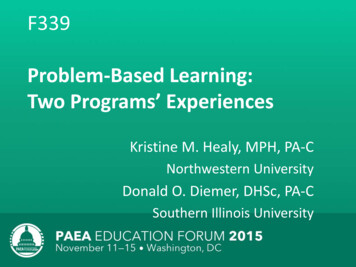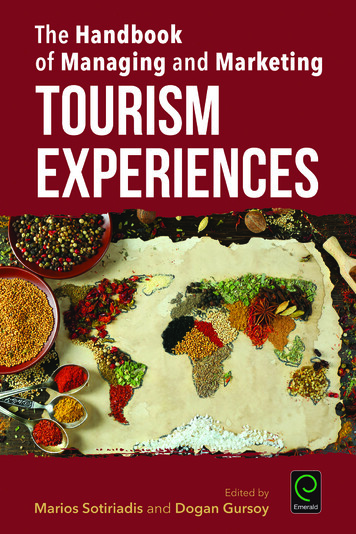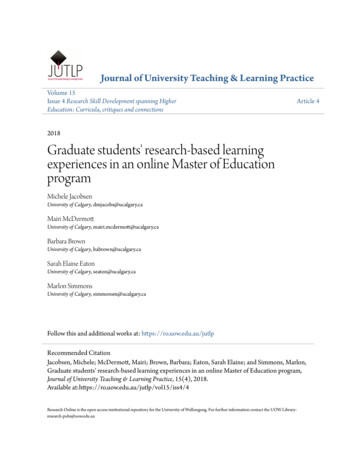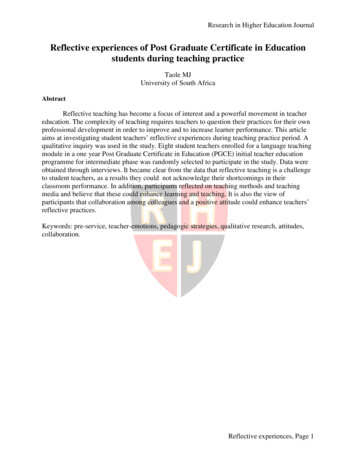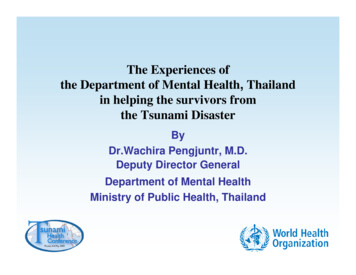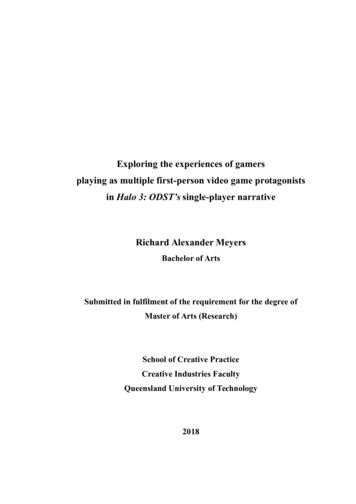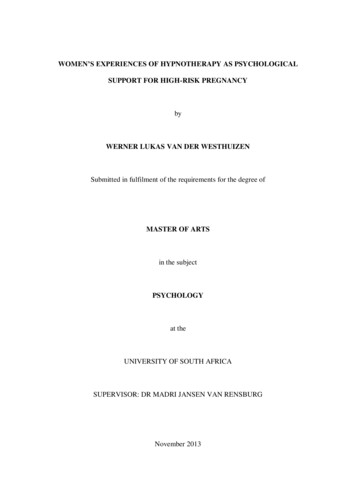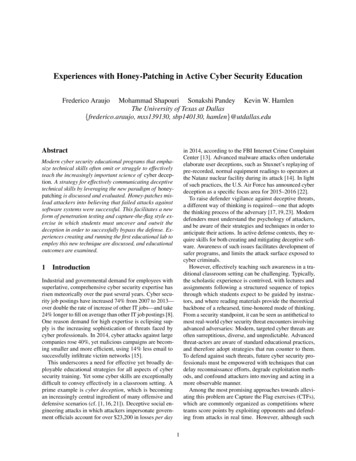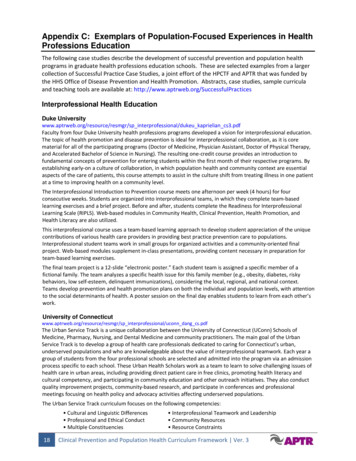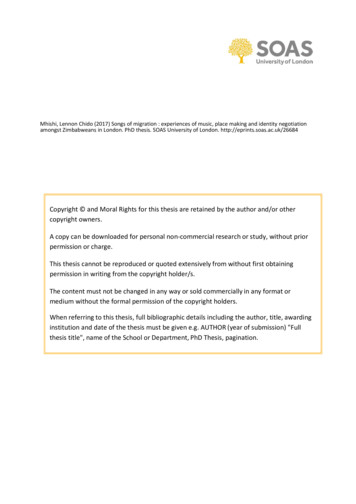
Transcription
Mhishi, Lennon Chido (2017) Songs of migration : experiences of music, place making and identity negotiationamongst Zimbabweans in London. PhD thesis. SOAS University of London. http://eprints.soas.ac.uk/26684Copyright and Moral Rights for this thesis are retained by the author and/or othercopyright owners.A copy can be downloaded for personal non‐commercial research or study, without priorpermission or charge.This thesis cannot be reproduced or quoted extensively from without first obtainingpermission in writing from the copyright holder/s.The content must not be changed in any way or sold commercially in any format ormedium without the formal permission of the copyright holders.When referring to this thesis, full bibliographic details including the author, title, awardinginstitution and date of the thesis must be given e.g. AUTHOR (year of submission) "Fullthesis title", name of the School or Department, PhD Thesis, pagination.
Songs of Migration: Experiences ofMusic, Place Making and IdentityNegotiation Amongst Zimbabweansin LondonLennon Chido MhishiThesis submitted for the degree of PhD Anthropology andSociology2017Department of Anthropology and SociologySOAS, University of London1
I have read and understood regulation 17.9 of the Regulations for students of theSOAS, University of London concerning plagiarism. I undertake that all the materialpresented for examination is my own work and has not been written for me, in wholeor in part, by any other person. I also undertake that any quotation or paraphrasefrom the published or unpublished work of another person has been dulyacknowledged in the work which I present for examination.Signed:Date:2
AbstractThis work constitutes an effort at foregrounding experiences of Zimbabweanmigration that are not necessarily characterised by abjection. Against hegemonicnarratives of crisis and instability and the experiences of dislocation thatZimbabweans have gone through, I convey the messiness and complexities ofmigrancy and inhabiting the elsewhere. I am also tracing some of the elements of acomplicated historiography that Zimbabwean presence in Britain reveals, especiallywhat I term an enduring colonial encounter. I explore experiences of Zimbabweans inLondon mediated by music, as it is experienced in time and place, yet alsotranscending them in the formations and reproductions of diasporic andtransnational being and belonging. Recognising that Zimbabwean experiences inBritain are part of a lineage and genealogy of black, Afro-Caribbean and diasporicstruggles, resistance, survival and conviviality, I explore London with otherZimbabweans to understand how music mediates sociality and becomes a way ofresisting social death. This idea of social death and abjection, formulated specificallyto engage blackness and the afterlife of slavery, I use here as a conceptualisation ofthe precarities and negative possibilities that come with the diasporic journey andattendant experiences. Inhabiting black bodies, and inserted into the dominantnarratives of the migrant, how then do Zimbabweans in Britain negotiate being andbelonging? It is here that I turn to music. Music stakes out a cultural space and can bean important part of everyday life, of ritual, myth and art, as avenues for theconstruction of diasporic being and belonging, the private and intimate, as well as thepublic and shared collective representations of being Zimbabwean in London. Musicdoes not necessarily transcend the strains of social life, but as a set of practices tunedto and tuned by the flux and flow of human relationships, it is necessarily bound tothem.3
AcknowledgementsTo Tara, and Nunu, for breathing life into me, and into this project. I could not havefound the strength to continue. My supervisor, Paru, for being always human andpatient. They were not the easiest of times. There are many at SOAS who pushed andencouraged, and saw better days ahead. The Felix Trust, who made it possible for meto pursue the PhD. Baba, Amai, the Mhishi family, who continue to believe in me. Pier,Danai, Sabelo, Xolani, Natasha and many more in South Africa, for continuouslydemanding that I think, in your different ways. Wala and Kudaushe Matimba, withoutwhom London and music would have been strange. Finally, to all the Zimbabweanswho took their time to indulge me, this project would not exist without you. May yourlives in the elsewhere continue to be frivolous, to resist abjection and may Zimbabwebe a better home.4
Table of ContentsAbstract . 3Acknowledgements . 4Introduction and Background. 6Chinoziva Ivhu Tracing Black Footsteps in A Concrete Jungle . 11Why Don’t You Carve Other Animals? . 22Writing Zimbabwe, Doing Ethnography in The Elsewhere . 25Why Music? . 36History Will Break Your Heart; Not in a Thousand Years . 49Harare North: Singing the Blues in Zimbabwe and its Elsewheres. 61London is the Place for Me . 71No Irish, No Blacks: Early Experiences of Britain. 81Club 414 and Paul Lunga in Brixton . 88Performing the Decolonial: Music and Migration to Britain through Rhodesia intoZimbabwe . 91All that Jazz . 96Historical Traces, Transnational Connections and Diasporic Sensibilities: Mudhara Walaand Fred Zindi . 108Sanganai Bar: Conviviality and The Play at Belonging . 132Oliver Mtukudzi and Sulumani Chimbetu in London: Generations of Zimbabwean Music onStage . 151And the Beat Goes On . 152On Thinking Place/Space, Home and Belonging . 159Gochi-Gochi and Zim-dancehall . 169Let These People Enjoy–They Work Very Hard . 177Zvesvondo: A Case of Religion and Musicking in the Zimbabwean Diaspora . 200Zimbabwean and Catholic in Britain . 202Our Lady of Good Counsel . 204Songs of Salvation? Religion and its Discontents . 206The Genesis . 209Whiteness as Absence and Invisibility: Contesting the Idea of a Zimbabwean Identity . 233Tracing the Story of White Zimbabwean Music(ians): Some Insights from Fred Zindi . 237Kamikaze Test Pilots at the Gochi-Gochi. 239Conclusion . 243Bibliography . 2475
Introduction and BackgroundThis work constitutes an effort at foregrounding experiences of Zimbabweanmigration that are not necessarily characterised by abjection. Against the backgroundof hegemonic narratives of crisis and instability and the experiences of dislocationthat Zimbabweans have gone through, I am interested in conveying the messiness andcomplexities of migrancy encapsulated as the elsewhere. Similarly, I am also tracingsome of the elements of a complicated historiography of Zimbabwe that Zimbabweanpresence in Britain reveals, especially in the sense of what I term an enduring colonialencounter and coloniality. The overarching question I sought to answer is: how doesmusic mediate belonging and identity amongst Zimbabweans in London? Related to thiswere also questions about the constitution of Zimbabwean subjectivities and what itmeans to write the complex narratives of being Zimbabwean in the elsewhere as anembodiment of black existence and alterity in the face of abjection and social death.In this vein, I explore experiences of Zimbabweans in London mediated by music, asit is experienced in time and place, yet also transcending them in the formations andreproductions of diasporic and transnational being and belonging.Recognising that Zimbabwean experiences in Britain are part of a lineage andgenealogy of black, Afro-Caribbean and diasporic struggles, resistance, survival andconviviality, I explore London with other Zimbabweans to understand how musicmediates sociality and becomes a way of resisting social death. I borrow the idea ofsocial death from Sexton, and Wilderson (Sexton, 2011; Wilderson III, 2008), tosuggest that the diasporic experience for Zimbabweans has been characterised by adominant narrative of abjection due the socio-political and economic crisis inZimbabwe that brought Zimbabwean migration to the fore. This idea of social deathand abjection, formulated specifically to engage blackness and the afterlife of slavery,particularly in the United States of America, I use here as a conceptualisation of theprecarities and negative possibilities that come with the diasporic journey andattendant experiences.Inhabiting black bodies, and inserted into the dominant narratives of the migrant,how then do Zimbabweans in Britain negotiate being and belonging? It is here that Iturn to music. Musicking, as argued by Small, encompasses the aspects of listening,performance and dance and can be an important part of everyday life, of ritual, myth6
and art, as avenues for the construction of diasporic being and belonging, the privateand intimate, as well as the public and shared collective representations of beingZimbabwean in London (Small, 2011). Les Back points out that the music of theAfrican diaspora is not a recent import to Europe, having been an integral part ofnumerous European societies since the 18th Century. Through the hands and voicesof slave musicians, jubilee singers, jazz orchestras, reggae sound system operatorsand hip hop DJs (Back, 2000).I have, to (mis)use language that has been the rage in political spaces of popularculture, ‘appropriated’ the concept of ‘musicking’ from Small to encompass acts,practices and performances that are musical, ranging from singing and dance, tolistening and attending live music shows, among others (Small, 2011). All musicking,as he argues, is serious musicking, and no one style of musicking can be said to bemore serious than another. The recognition of music as being part of, and conveyingcultural ‘baggage’ signifies the social construction of musicality, or what is referred toin this conversation as musicking—and how musicking can be an important part ofeveryday life, of ritual, myth and art, as avenues for the construction of migrant beingand of public images of sentiment. Whether it is listening, dancing, and any otherattendant aspects that accompany musicking, one of the questions to ask, as positedby Small is what a ‘performance’ means when it takes place at a certain time, withcertain people taking part. Musicking brings into existence a set of relationships,wherein meaning is created, circulated, reinvented, among other things and althoughchoices and ways of musicking may not be done deliberately or consciously, they arenever trivial (Small, 1999).There are many strands to being Zimbabwean in Britain (McGregor, 2010; Pasura,2010): asylum seekers; undocumented migrants; students; labour/economicmigrants; and those who gained British citizenship. I was not in this instanceinterested in their paperwork or status, which in many ways would also shape theirsense of precarity. This was not necessarily because it was not important, but becauseI was aware of the contentions around asking people about their status, and the kindsof hierarchies that such questions reproduce, even in a quest to understand. Iremembered my moments of being unsure about what certain documents I heldmeant for being in the elsewhere, and how I detested responding to questions about7
bureaucracy. To inhabit the body of the stranger is to also know not being humanenough, to be subjected to the processes and policing of bureaucracy that we try toescape when we seek conviviality, and try to make place despite always loomingexpulsions.Situating Zimbabweans as part of the black experience in Britain is also asking towhat uses are certain kinds of knowledge put? Histo
Zimbabweans to understand how music mediates sociality and becomes a way of resisting social death. This idea of social death and abjection, formulated specifically to engage blackness and the afterlife of slavery, I use here as a conceptualisation of the precarities and negative possibilities that come with the diasporic journey and
